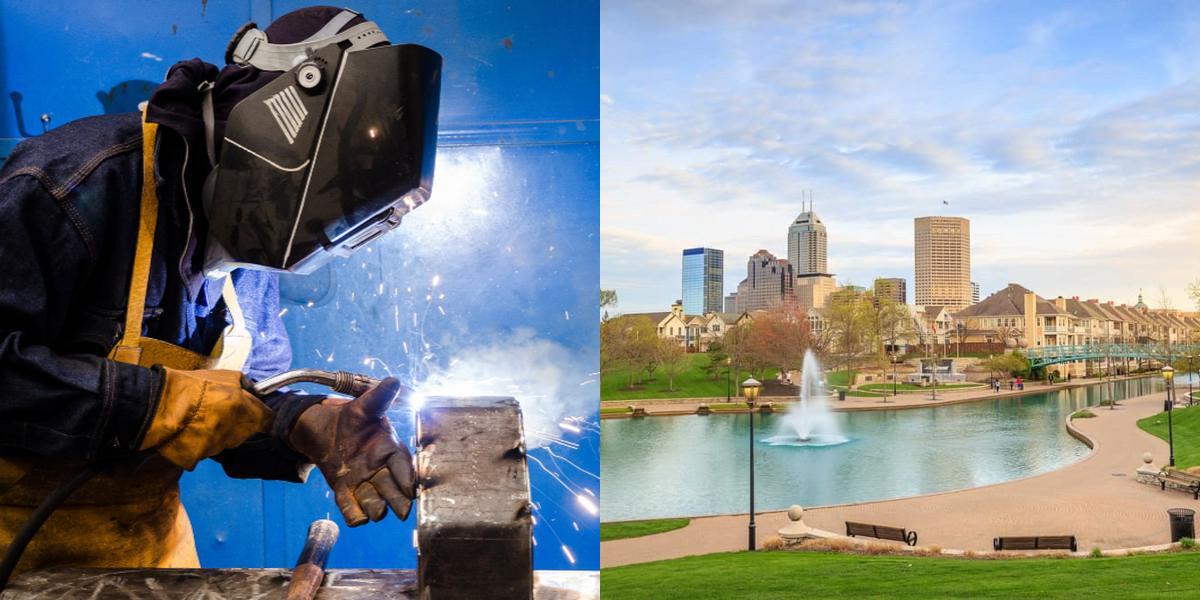How to Become a Welder in Indiana (2025)

A career as a welder in Indiana offers a direct path into a high-demand, skilled trade that forms the backbone of the state's massive manufacturing, automotive, and steel industries. With the U.S. Bureau of Labor Statistics (BLS) reporting a national median pay of $59,310 per year (May 2024), this hands-on career provides a secure future and a competitive wage for those with the right skills.
This guide details the specific steps you must take to get trained, certified, and hired as a professional welder in the Hoosier State.
Where can I find Welder classes in Indiana?
If you're looking for welding classes in Indiana, Dreambound is the largest platform for students to find and compare vocational training programs. Dreambound offers a comprehensive list of welding classes available in Indiana, including those in Indianapolis. You can visit Dreambound's website to explore welding training options near you.
Remember, pursuing formal training and certification can greatly enhance your career prospects as a welder. So, consider enrolling in a reputable program and start your journey towards becoming a skilled welder in Indiana.
How long does it take to become a Welder?
Becoming a certified welder involves several steps with variable timelines based on the chosen training program and personal dedication. Most start with vocational training, which can range from a few weeks to several months and covers welding fundamentals and safety. Following this, gaining hands-on experience through internships, apprenticeships, or entry-level jobs is crucial, with the duration depending on individual progress. Finally, to achieve certification, welders must pass a test that demonstrates proficiency in various techniques, such as stick, MIG, or TIG welding. Preparation and testing for certification typically take a few weeks to a few months.
What About Licensing in Indiana?
This is a critical point that is often misunderstood. Indiana does not have a state-level license for welders.
The Indiana Professional Licensing Agency (IPLA), which licenses trades like plumbers and electricians, does not license individual welders. Your "license" in this trade is your professional certification from the American Welding Society (AWS). While you can get an entry-level job as a helper without it, virtually all high-paying, career-track jobs will require you to be AWS-certified.
Career Paths and Opportunities after Becoming a Welder
Becoming a certified welder opens up a variety of career paths and opportunities. Here are some potential career paths you can explore:
-
Construction Industry: Welders are in high demand in the construction industry. You can work on projects such as building bridges, skyscrapers, pipelines, and even offshore oil rigs. This career path offers the opportunity to work on large-scale projects and collaborate with other skilled tradespeople.
-
Manufacturing Industry: Many manufacturing companies require welders to assemble and fabricate metal products. This could include anything from manufacturing automobiles and aircraft to creating industrial machinery and equipment. Working in the manufacturing industry often provides stable employment and the chance to specialize in a particular field.
-
Maintenance and Repair: Welders are essential in the maintenance and repair of machinery, equipment, and infrastructure. This can include repairing damaged structures, fixing heavy machinery, or maintaining pipelines and power plants. This career path offers a mix of on-site and workshop work, providing variety and challenges.
-
Specialized Welding: As a certified welder, you may choose to specialize in a specific area of welding. For example, you could become a certified underwater welder, working on projects such as repairing offshore oil platforms or inspecting underwater structures. Other specialized areas include aerospace welding, nuclear welding, and pipeline welding.
-
Entrepreneurship: With the skills and knowledge gained as a certified welder, you may choose to start your own welding business. This could involve offering welding services to clients, fabricating custom metal products, or specializing in a niche area of welding. Entrepreneurship provides the opportunity to be your own boss and have control over your career.
-
Welding Inspector: Another career path after becoming a certified welder is to become a welding inspector. Welding inspectors are responsible for ensuring that welding work meets industry standards and specifications. They inspect and test welds for quality, safety, and compliance. This career path requires additional certifications and training beyond the welder certification.
These are just a few examples of the career paths and opportunities available to certified welders. The demand for skilled welders is expected to grow in the coming years, providing plenty of options for career advancement and specialization.
Frequently Asked Questions
Is Indiana a good state for welders?
Yes, Indiana is one of the best states in the country for welders based on job volume. With over 19,000 welders employed, the state's massive manufacturing base (especially in automotive, RVs, and steel) provides a high and consistent demand for skilled, certified welding professionals.
How much does welding school cost in Indiana?
The cost varies. A short-term certificate program from a community college (like Ivy Tech) or a private trade school can range from $5,000 to $15,000. A 2-year associate's degree will cost more. The most cost-effective path is a paid apprenticeship, where you earn a wage while you learn for free.
Do you need a license to weld in Indiana?
No, Indiana does not issue a state license for welders. Employers require certification from the American Welding Society (AWS), which proves your skills. You do not need to register with the Indiana Professional Licensing Agency.
What is the highest-paying welding job in Indiana?
The highest-paying jobs are typically for specialized welders. Pipe welders (especially those with ASME 6G certification), TIG welders (who work with aluminum and stainless steel), and experienced Certified Welding Inspectors (CWI) often command the top salaries in the state, with many earning over $75,000 per year.
What's the difference between AWS and ASME certification?
AWS (American Welding Society) certification is the most common and versatile. It's often for structural steel, like in construction and manufacturing. ASME (American Society of Mechanical Engineers) certification is more specialized and is typically required for high-pressure welding, such as on boilers and pipelines.
Final Thoughts
Becoming a certified welder is a rewarding and fulfilling career choice. It requires dedication, training, and a commitment to continuous learning. By following the steps outlined in this guide, you can obtain your welder certification and open doors to a wide range of job opportunities.
Remember to research the specific requirements for certification in your area and choose a welding process to specialize in. Enroll in a welding program to gain the necessary skills and knowledge, and seek practical experience through internships or apprenticeships. Finally, pass the welding certification exam and continue to pursue further education and certifications to stay ahead in the field.
Once certified, you can start your job search by building a strong resume, networking with industry professionals, and exploring online job boards. Consider apprenticeships and entry-level positions to gain experience, and prepare well for interviews to showcase your welding skills and work ethic.
After starting your career as a welder, explore various career paths such as construction, manufacturing, maintenance, specialized welding, or even entrepreneurship. With the right skills and dedication, the possibilities are endless.
So, take the first step towards your welding career and start working towards your welder certification today. The welding industry offers a promising future, and you can be a part of it.
Looking for a better fit? These other articles could be more in line with your expectations if this one isn't precisely what you had in mind:

Pia Yapjoco is part of the school growth and sales team at Dreambound. She helps facilitate school partnerships that expand educational opportunities for aspiring students in allied health and other trades. Beyond work, she curates her pup's Instagram, hunts for hidden coffee gems, and escapes into cozy gaming.





